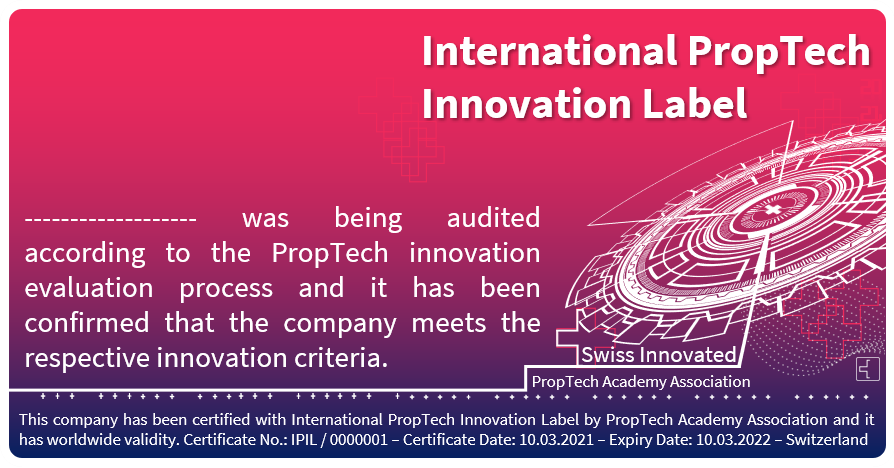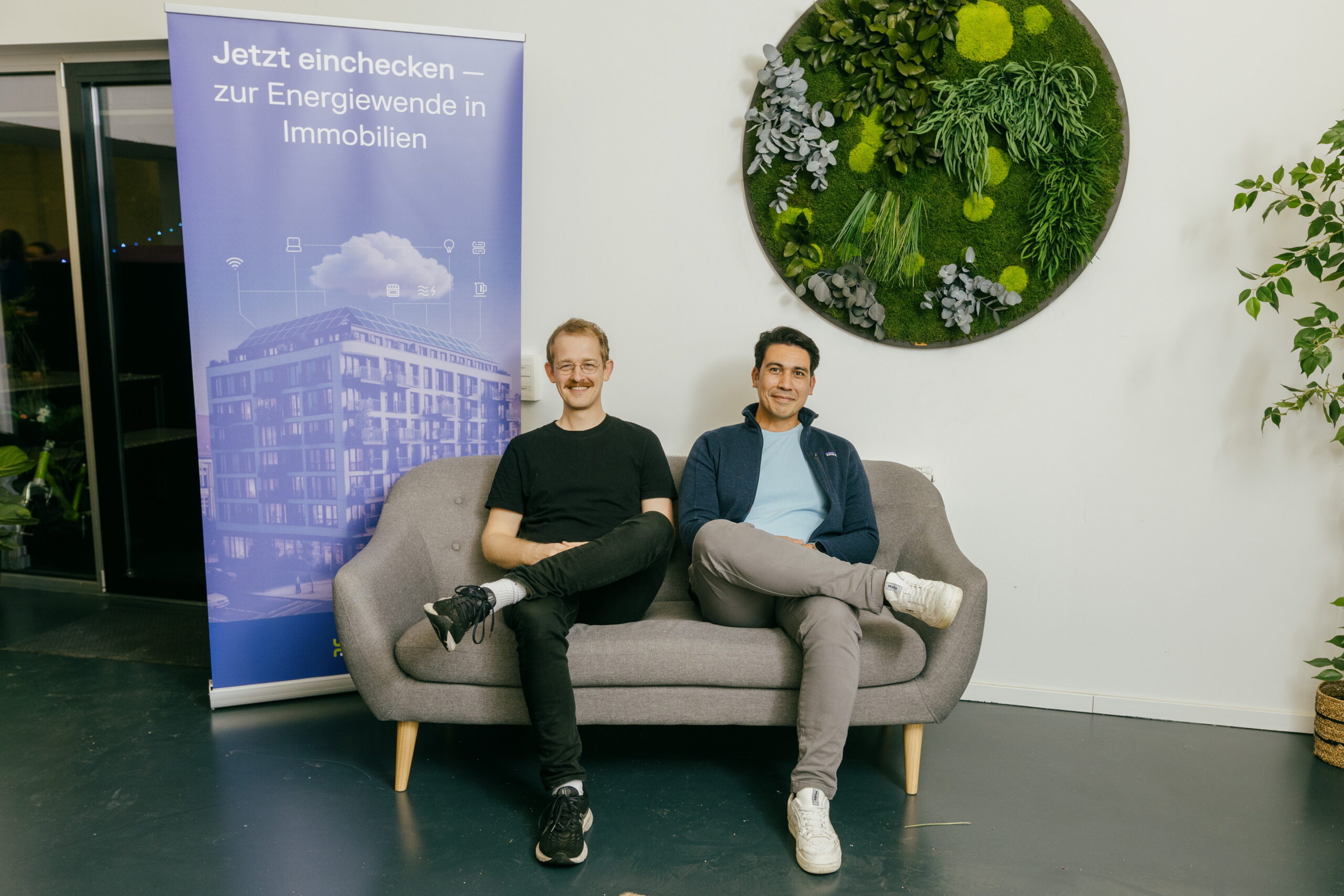International PropTech Innovation Label
INTERNATIONAL PROPTECH INNOVATION LABEL Setting new PropTech Standards The PropTech Innovation Evaluation Method is not a conventional company evaluation process. Neither is it a traditional measure of innovation. And it does not aim to solely analyze and evaluate start-ups. Instead, it has been created with the goal of evaluating any and every company in the real estate, construction or finance sectors. Crucially, it is also based on the world’s first-ever PropTech innovation evaluation process. The “PropTech Innovation’ evaluation process forms part of the International PropTech Standards, which were developed and launched by the PropTech Academy Association in 2020. The Association is a regulatory institution that aims to promote an international standardization and evaluation process for PropTech companies in the real estate, construction and finance sectors. The International PropTech Standards are designed to serve as quality management system for PropTech companies. They set out the requirements that a specific type of product, component, system, service or process must fulfil in order for it to qualify as ‘fit for purpose’. The standards encompass methods of testing, terminology and definitions, as well as information requirements and the compatibility of various connections. The standards are established by consensus and approved by recognized standardization bodies. They provide individuals, businesses and all types of organizations with a common basis for mutual understanding. They are especially useful for communications, measurement, commerce and manufacturing. In particular, they facilitate trade by ensuring the compatibility and interoperability of components, products and services – delivering benefits for businesses and consumers as a result of lower costs, enhanced performance and increased safety. The primary objective of standardization is the definition of voluntary technology, innovation, sustainability or quality specifications that current or future products, manufacturing processes or services can comply with. Standardization can encompass various areas – from the standardization of different grades of service and products to the creation of consistent technological specifications for product or services in markets where compatibility and interoperability with other products or services are essential. The International PropTech Standards were established in cooperation with leading universities and institutions. The Standards Committee is an independent and politically neutral body based in Switzerland. PropTech Innovation evaluation process In connection with the International PropTech Standards, the PropTech Academy Association has developed a new methodology to evaluate companies based on their level of innovation. It encompasses 12 categories and more than 100 criteria for the real estate, construction and finance sectors. There are three criteria that must be met for an innovation to be successful: Innovation is work. It requires knowledge, ingenuity, creativity, etc. Besides, innovators rarely work in more than one area – be it finance, real estate, construction or another sector. Their work requires diligence, perseverance and commitment. Innovation has an effect in economy and society. It involves a change in the behavior of clients, teachers, farmers, doctors – in other words, the community as a whole. Innovation may also involve a change in a process, in the way people work or how they manufacture products. Innovation must always be close to the market, focused on the market and market-driven. Innovation is, by its very nature, a high-risk undertaking, as is all economic activity. Innovators define risks and seek to minimize them. Innovations are successful when they systematically identify sources of opportunity and then exploit them – whether they entail a small and quantifiable risk or a larger but still quantifiable risk. Successful innovators take a conservative view of risk while focusing on realizing opportunities. The ‘PropTech Innovation’ evaluation process does not solely encompass classic definitions of innovation and general market requirements. Instead, it involves a new methodology developed using specific definitions of PropTech sectors and factoring in aspects such as uniqueness, disruption, technology and human capital in the real estate, construction and finance sectors. The evaluation method uses subjective criteria when assigning the score. It evaluates a range of data based on official and public company information – including presentations, whitepapers, the CVs of founders and the management team balance sheet, usage cases, websites and other information. The evaluation processes cover 12 main categories; 1. Uniqueness • The business models, services and products must be unique and not easy to replicate. • New product and not easy to copy, • New service and not easy to copy, • A new business model and not easy to copy, • Recognition value. 2. Disruption The new business model, service or product must create a new market or replace an existing one. • Creating a new market, • Potential to replace existing product or service, • Potential to change life and work styles, • Potential to change business models, • New solutions fill all market gaps and serve all participants, • Through quality raising, offering new payable solutions. 3. Technology New technological solutions must be developed and delivered in response to current needs and knowledge. • Producing own devices and tools, • New products based on scientific breakthroughs, • Enhancing the digital transformation in industry, • Changing Work-Flow Management, • Changing Time Management , • New technology must integrate with existing solutions, • New technology must be resilient against cyber-attacks, • Services and products must be transparent, • Creation of transparency through users, • Network readiness. 4. Human capital Human capital is an essential driver of innovation and invention. Employees must be educated, experienced and creative. • 5 years of sector experience, • Education in sectors, • Market knowledge, • Research Skills, • Ability to develop service and product, • Ability to define technologies, • Ability to define sustainability in sectors, • PropTech knowledge, • Fielding an experienced executive team, • Learn entrepreneurship skills. 5. Process optimization The business models, services and products must enhance lifestyles and working methods. • Improvement in the use case, • Reducing time and cost. 6. Sustainability The business models, services and products must have environmental, social and/or economic benefits. • Ecological benefits, • Social benefits, • reducing bureaucracy, • Smart using of resources. 7. Functionality The products must be modular, appropriate and capable of interacting with designated systems. • Appropriateness: suitability of functions for specific tasks, • Interoperability: Ability to interact with given systems, • Conformity: Ability of the product to comply with standards, conventions or legal provisions and similar regulations with regard to functionality, • Compliance: Features of software that ensure that the software/product fulfils application-specific standards, • Life cycle assessment 8. Compatibility The business models, services and products must be compatible with current technologies and needs. • The service and product must be compatible with current technologies, • Service and products must be suitable with current knowledge, • Products should be designed modularly. It should be possible to take them apart for reparation or replacement of a part, • Different products and components are mutually compatible and will function properly when connected together. 9. Feasibility The solutions must be feasible, understandable and unambiguous. • The services must be understandable and unambiguous, • The qualifications, experience and competence to implement, • Economically, • Feasibility - is the technological approach feasible in principle? • Technical risks - are the project challenges manageable? • Clear guidelines for using. 10. Reliability The solutions must be stable and effective over the long term and lead to an increase in employee and client satisfaction. • Acceleration of business, • Increase in employee satisfaction, • increase in customer satisfaction, • Long life using possibility, • Are sufficient resources provided? Or a stop-and-go policy? 11. Market needs The services and products must meet market needs and close gaps, offering a wide range of applications. • A wide range of applications, • Payable prices, • adaptability to changes in the market, • Serve a critical market need. 12. Solving problems The business models, services and products must address or resolve a specific problem. Using these categories and basic criteria, the companies are evaluated according to their business model, service and product. Each category has its own characteristic criteria. • Solving the right problem, • Knowledge of the problems, • Address a specific problem. The PropTech Innovation story The PropTech Innovation evaluation method was developed in Switzerland and is the first process of its kind in the world. It was used in the creation of the International PropTech Standards. The methodology symbolizes innovation and invention. The PropTech Innovation Label can provide significant advantages for companies. It serves as an international hallmark or quality seal – making it easier for them to operate beyond their domestic market – thus geographically expanding their activities and opening up new sources of sales and revenues. Businesses using a PropTech Innovation Label benefit from an enhanced image and can demonstrate to existing and prospective clients around the world that they operate in compliance with specific standards. For many clients and consumers, this is a sign that the companies in question offer excellent products and services in terms of quality, consistency and safety. The PropTech Innovation Label provides clear guidelines and instructions which, when correctly applied, should ensure that a service or product will satisfy a series of specific quality, innovation, technology and sustainability criteria. This, in turn, can help to drive enhanced performance and reliability – allowing you to attract and retain clients and making your business more competitive and successful. The PropTech Innovation Ranking is a useful tool for ensuring that different products and components are mutually compatible and will function properly when connected – whether you are considering your own range of products and services or those offered by other companies and organizations. Higher levels of client confidence and satisfaction Gaining the confidence of your clients and keeping them satisfied is crucial for the long-term success of your business. The PropTech Innovation Label can help you realize these goals by enabling you to maintain high levels of quality throughout the product development and manufacturing process, or when delivering a service. If your clients are confident about your ability to supply high-quality products or services in an efficient and consistent way, they are more likely to continue buying your products, using your services and supporting your business. Improved market access as a result of increased competitiveness and efficiency, reduced trading costs, simplified contractual agreements and increased quality. Easier launch of innovative products due to interoperability between new and existing products, services and processes. Examples include buildings lifecycle management, workflow management, energy efficiency, reduction of CO2 emissions, smart cities and smart buildings. The PropTech Innovation Label can make an important contribution to the development of sustainable industrial policy, unlock the potential of innovative markets and strengthen the position of PropTech in the real estate, construction and finance sectors. It provides a solid platform that can be used to build and disseminate innovative technologies and enhance business practices. Build better business with the PropTech Innovation Label The PropTech Academy's central platform – encompassing the construction, real estate and finance sectors – provides a combination of innovation, technology and sustainability. As a unique innovative space, the Academy's primary objective is to create an intellectual community of multi-disciplinary professionals to conduct specialist work on innovation that can positively influence the development of these sectors. At the same time, the PropTech Academy is a regulatory institution that aims to create international standardization and evaluation processes for PropTech companies in the real estate, construction and finance sectors that require quality management systems. These companies set out the requirements that a particular product, service or process must fulfill to qualify as 'fit for purpose.’ More information about the label and process is available on; www.proptechacademy.ch




